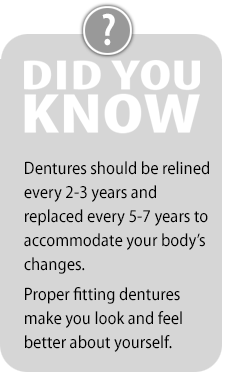
New to Dentures
Dentures are prosthetics and unfortunately will not feel and perform the same way as your natural teeth. (See Implant Dentures for the closest option to natural teeth). Understanding common experiences and keeping a positive attitude are important for a successful transition. It’s rather difficult to accurately predict exact durations of recovery or adjustment periods, as few if any patients have identical experiences. Average periods of adjustment vary from a week to 6 or more months depending on each patient’s state of health, rate of healing, and degree of surgery complexity.
The first set of dentures (or new ones after extremely old ones) are always harder to get used to. Be reassured that the body will adapt to the dentures and create a new normal of function.

Will the dentures look like real teeth or will they change my appearance?
- In many cases, dentures are replacing poor or damaged teeth. Because of this, many people are happy and feel more comfortable smiling than they have before.
- We hand craft and customize the dentures specifically for you.
- You get to choose the color, size and style of teeth. We can match to personal photos or to a photo of a smile you would like recreated. Family members or friends are also welcome to come and provide a second opinion if so required, leaving the final decision to you.
- We provide a wax “try in” denture that allows you to see what the dentures look like in your mouth. Esthetic changes can be done if needed (teeth size, shape and shade) to help make you more comfortable with an end product you will like.
- Facial muscles and lips may feel stiff and unnatural but will soon relax and adjust to your new dentures.
- Any unfamiliar object (the denture) in your mouth initially feels abnormally large. This feeling will pass as the denture starts to feel more normal.
- Saliva glands become more active with any unfamiliar object in your mouth. Saliva production should return to normal within a few days as the denture is accepted as normal.
- Tongue and cheek muscles try to push the unfamiliar denture out of your mouth, creating the sensation of a moving denture.
- This sensation will lessen as the muscles adjust and instead start to work to hold the dentures in place. Closing your mouth and lips and sucking gently on your dentures will help retrain your senses and help eliminate the feeling of looseness.
- Lisping, whistling, spitting and the sensation of a floating lower denture are common as your tongue adjusts to where it contacts to form words.
- Small adjustments can help with these speech issues. With patience and by practicing and repeating difficult words or reading aloud, your speech will greatly improve.
- Tissues in the mouth are very sensitive, and sore or pressure spots may result before they completely adjust to the new dentures.
- If a sore spot lasts more than 3-4 days, it should be adjusted by the denturist or it will only get worse and aggravate the tissues more. Dentures do not need broken in nor the gums to be toughened up. It’s important to get adjustments when needed.
- Adjustments during the first few weeks are common.
- Using a salt water rinse (1/2 – 1 tsp salt to 1 cup warm water) three times a day can help heal the irritated area or a product like Oxyfresh Dental Gel.
- This transition may be the most challenging and take as long as 6 months or more.
- The mouth must retrain the tongue, cheek and lip muscles to keep the dentures in place during chewing and speaking.
- The successful chewing with your dentures depends on your determination, practice and patience with your progress.
- It is best to begin with very small bites of soft food, placed evenly on both sides of your mouth, chewing slowly and gently in an up and down motion.
- Use the teeth to the side of the front ones for hard food such as carrots and apples.
- It’s not recommended to bite off anything with your front teeth due to the pressure which may dislodge the denture and snap off teeth.
